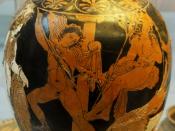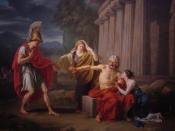Character Flaw of Oedipus In Sophocles' Oedipus Rex, Oedipus, the king of Thebes, is faced with a problem: Who is the murderer of the former king, Laius? But as the play progresses, the question changes shape into a different problem: Who am I? The answer to this question is not what Oedipus expects. In fact, it is a complete reversal. Teiresias, the old blind prophet, is summoned to Thebes before Oedipus to tell of Laius' murderer and, somehow, end the plague on the city, but the behaviors of Teiresias are not what Oedipus anticipates.
During the confrontation scene between Oedipus and Teiresias, Oedipus truly exhibits his character flaw of impulsiveness.
Initially, Oedipus is a very respectful, responsible man. At the opening of the story, the city of Thebes has been severely plagued with sick herds, stillborn children, and attitudes of despair. Creon, brother to the Queen, sends for Teiresisas, who is the blind, wise prophet.
At the beginning of the encounter between Oedipus and Teirisias, Oedipus instantly acknowledges the prophet's presence with great flattery by greeting him with a very respectful and humble tone. He refers to him as "seer: student of mysteries, / Of all that's taught and all that no man tells"(Sophocles 16). However, because Oedipus is aware of the prophet's purpose, he anticipates his revelation.
Because Teiresias knows that Oedipus' past is the cause of Thebes' troubles, he is extremely reluctant of telling Oedipus the truth. He even regrets coming to Oedipus, but Oedipus' curiosity is at a fevered pitch. Oedipus' concern causes him to ask Teiresias, "Why are your eyes so cold?"(17). He really wants to know the reason for Teiresias' reticence. The prophet refuses to share his knowledge and tries to persuade Oedipus into letting it go, but it only makes the situation worse. Oedipus' feelings have now developed into frustration, which later causes him to plead for the truth. He impulsively says to Teiresias, "What you say is ungracious . . . / Do not refuse to speak"(17).
Teiresias holds out even longer, stating, "No; I will never tell you what I know"(18).
Oedipus eventually begins begging from sheer exaspiration. He states, "In God's name, we all beg you"(17). His impetuous nature causes him to be unable to think logically about the reason for Teiresias' secrecy.
Teiresias feels that he should not share his misery by telling the truth.
Meanwhile, Oedipus' exaspiration has now become anger as he speaks in an accusatory tone: "You betray us all and wreck the state? (18). Now Oedipus' impulsive behavior is no longer hidden; it can be clearly seen. He has accused the prophet of betraying the people of Thebes. His accusations are a result of his inability to think logically. He also insults Teiresias. He states, "What a wicked old man you are!"(18). Teiresias replies, "if you could only see / The nature of your own feelings"(18).
Oedipus' accusations have gone from charges of betrayal to charges of planning Laius' murder to committing the act. Oedipus is very angry and is still unable to think clearly. His rashness causes him to make bizarre accusations. He declares, "I'll tell you what I think: / you planned it, you had it done"(19). The words of Oedipus, by this time, have angered Teiresias, who is forced to tell Oedipus that he is the murderer. He states, "You yourself are the pollution of this country"(19). At this point, Oedipus' emotions, which sprang from his reckless behavior, have caused him to become uncontrollable; he is in a state of complete shock and anger. Oedipus, fed up with Teiresisas' bold words, tells the prophet "You'll pay for it"(20). His feelings have blinded him from all reason and control. His impulsiveness reigns. As Teiresias sticks to his proclamation, Oedipus reacts to him with disbelief and rage, calling him a "sightless, witless, senseless, mad old man"(20).
Teiresias tries to tell Oedipus that his fate is not from him, but from the gods.
Oedipus believes that the old prophet has purposely tried to cause him trouble. He says to Oedipus, "That lies within Apollo's competence"(21). As soon as he says "Apollo," Oedipus remembers sending Creon to Delphi to receive an oracle. Oedipus immediately starts charging Creon outrageously. He believes that Creon coerced the "decrepit fortune-teller," Teiresias, into delivering this message, so that he, Creon, may become closer to taking his wealth and position (20). His impulsiveness causes him to go from one ludicrous accusation to another. He exclaims, "Creon desires in secret to destroy me!"(21). He believes that the old prophet and Creon will pay for their evil conspiracy.
He says to Teiresias, "you and your friend Creon, it seems to me, / Will suffer most. If you were not an old man, / You would have paid already for your plot"(22). At this point, the Chorus offers some advice for Oedipus. They recognize the amount of anger that Teiresias and Oedipus have: "We cannot see that his words or yours / Have been spoken except in anger" (22).
It is obvious to everyone in the plot that Oedipus is in such a state of anger, that every word he says is irrational. This angry tone was once reverent and polite, but now Teiresias' anger shows. He tells Oedipus, "with both your eyes, [you] are blind: / You can not see the wretchedness of your life"(22). He reminds Oedipus that no one will suffer more than he, not he, nor Creon. Oedipus reacts with disbelief. Regardless of all the reason and truth that the wise Teiresias has shared, Oedipus remains blind to truth and to reason. He tells Teiresias, "Damnation / Take you! Out of this place!" (23). He does not stop to think that he originally asked Teiresias to come and reveal Laios' murderer! His feelings have taken over his sense of rationality. Oedipus' unpredictable behavior has aroused a great deal of anger within Teiresias who insults Oedipus by saying, "You were a great man once at solving riddles," referring to the riddle of the sphinx that Oedipus solved to save the city (24). The old prophet does not appreciate Oedipus' behavior.
However, before Teiresias exits, he shares with Oedipus an ironic prediction concerning the murderer of Laios' murderer. He describes him as "A blind man, / Who has eyes now; a penniless man, who is rich now"(25).
Oedipus is truly a dynamic character, whose changing emotions cause him to sometimes behave uncontrollably. Through this particular scene between Oedipus and Teiresias, Oedipus' tone is initially reverent, but develops quickly into frustration, anger, and accusations. All of his behaviors branch from his imprudent personality. The problem lies deep within Oedipus who seems unable to truly understand his identity.
This particular scene captures the very essence of Oedipus' character flaw of impulsiveness by revealing the process of his character change in this one conversation.





